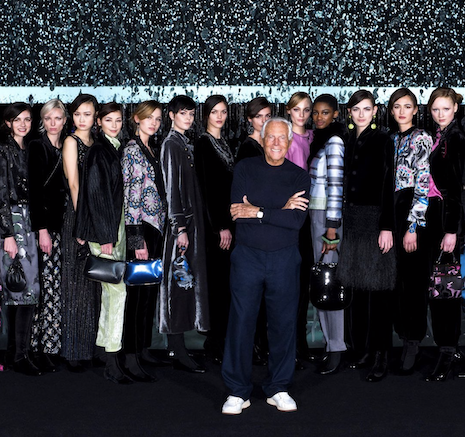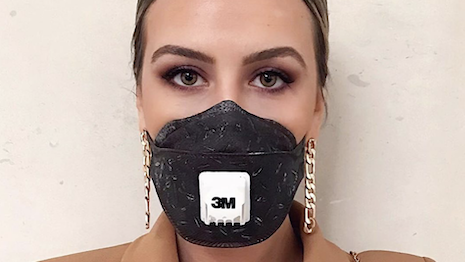The coronavirus is taking its toll on the health of the luxury business, as uncertainty is keeping consumers home, stock markets worldwide gyrate unnervingly and oil prices plummet.
Concerns about a recession are keeping consumers from going shopping and planning for vacations. Bernstein and Boston Consulting Group estimate that the coronavirus could lose up to $43 billion in luxury sales this year.
“As far as today goes, many stores including the luxury ones are virtual ghost towns,” said Bob Shullman, founder/CEO of the Shullman Research Group, Stamford, CT.
“As far as the rest of the year goes, only time will tell, but the luxury markets will not recover most likely until consumer confidence recovers,” Mr. Shullman said. “The only recent example we have is what happened in 2008 when Lehman tipped.”
 Bob Shullman is founder/CEO of The Shullman Research Group. Image courtesy of Bob Shullman
Bob Shullman is founder/CEO of The Shullman Research Group. Image courtesy of Bob Shullman
Wait and see
The current outlook looks dire. Flights are being grounded. Hotels and stores are empty. Americans are being warned to avoid cruises.
At this moment consumers are wondering if and what plans they can make this year. This hesitation is not helping.
The vast majority of consumers are not willing to risk an infection as the virus continues to spread.
“The fear is of a recession,” said Al Ries, chairman of Roswell, GA-based positioning consultancy Ries and author of Positioning. “Many luxury shoppers are afraid to go out in public and are afraid their financial situation could get much worse. Actually, I remember the Depression in the 1930s. It was terrible.
History indicates that when the stock market tanks, virtually all consumers take a deep breath and most of the time hold back on executing any plans they have to buy non-essential goods and services such as luxury products and services, Mr. Shullman said.
“Weathering this storm is not going to be easy in any way, shape or form,” Mr. Shullman said.
“I suspect we are going to see a fair number of layoffs and potentially some weak brands going under," he said. "The brand best be praying that the virus is like the flu and tends to take a pause during the warmer spring and summer months.”
 Giorgio Armani fashion show sans audience at Milan Fashion Show 2020. Image credit: Giorgio Armani
Giorgio Armani fashion show sans audience at Milan Fashion Show 2020. Image credit: Giorgio Armani
Arrivederci?
Italy is home to hundreds of luxury brands including Gucci, Bottega Veneta, Brunello Cucinelli, Brioni, Valentino, Versace, Prada, Armani, Dolce & Gabbana, Marni, Iceberg, Tod's, Loro Piana, Missoni, Trussardi, Moschino, Dirk Bikkembergs, Salvatore Ferragamo and Ermenegildo Zegna. It is also the Western country most affected by the coronavirus, and currently in a government-mandated national lockdown.
When COVID-19 first came Italy, Giorgio Armani held its fashion show during Milan Fashion Week without an audience. It was a harbinger of things to come.
If Italians cannot leave their houses and affluent tourists cannot visit Italy, luxury across sectors is the big loser.
“The lockdown will impact the manufacturing of the luxury brands that actually manufacture in Italy what they sell around the globe,’ Mr. Shullman said.
“As such, the Italian brands such as Tod’s, Prada, Gucci, Bottega Veneta and Ferragamo that, according to a WSJ article on Saturday [March 7], will most likely will experience difficulties producing what they ship to retailers around the globe,” he said.
“For luxury retailers, I envision some layoffs and potentially the closing of some locations,” he said.
But it is not all bad news.
Mr. Ries said that some of these Italian brands, many of whom are represented at retail globally and can be ordered online from anywhere in the world, may be able to turn it around.
“It will actually help Italian brands,” Mr. Ries said. “Many people will buy Prada and other Italian brands because they feel sorry for the situation in Italy.”
But Italy will not be able to appeal to the sympathy of travelers who will not be coming any time soon.
"All Italian hotels will be closed," said Richard Cutting-Miller, executive vice president at travel consultancy
Resonance, Vancouver, BC. "The impact will be devastating.
"The spring and probably summer season will be lost," he said. "Fall will also suffer a significant loss, but will see some business slowly returning. Normal hotel business will not return until 2021."
And Italy may hint at what is to come for other regions.
"In those places where there is an outbreak or lockdown, the hotels will close or run with absolute minimum staff for the duration of the event," Mr. Cutting-Miller said.
"For all other hotels, the hospitality business will suffer significant loses in occupancy and revenue," he said. "Most meetings, conferences and group travel will be cancelled. The overall impact on the global hospitality business will be significant."
Cue from China
Chinese shoppers are some of the most avid consumers of luxury goods and they have already been through what seems like the worst of the coronavirus.
Cases in the country have steadied, according to reports. If things get better, the economy could rebound there and bring affluent consumers out of lockdown.
“The good news is the situation in China, which seems to be improving,” Mr. Ries said.
Luxury brands may look to China to understand how the year will fare in Europe and the United States.
In the meantime, luxury brands will have to hold tight and manage expectations through these uncertain times, perhaps building brand over social media to be top of mind when shoppers return to stores.
“There is not much they can do,” Mr. Ries said. “The worse thing is to hold sales, which would undermine the perceptions of the brands. Just keep your fingers crossed.”
 Al Ries is chairman of positioning consultancy Ries
Al Ries is chairman of positioning consultancy Ries
Optimism in dark times
In the meantime, the luxury sector is growing and new categories such as electric vehicles offer opportunities to marketers and appealing products to consumers.
“The biggest opportunity in any business is to develop a new category,” Mr. Ries said. “And then be the first to launch a new brand in that new category. Tesla is worth more on the stock market than General Motors and Ford combined.
“My belief is that things will improve by the end of the year,” he said. “Hope springs eternal. Hopefully, the situation will change in the near future. The coronavirus will decline and the stock market will go back up.”
{"ct":"0FB3mN+BY6ZwW6B8NQHRNzctrWN5fy9Oj8JGbJKOF7z8NSTmGHtDvNRNnoAB+m1VLx71JP0W4Dow8fxS7UgGInCbtGQfiWOTFQMjwRqNARdS3+s6Wx64h9myVMXn0ecCV3FPBYb+ghOgFkbwfd2NLLY+\/qDYXEAGtS6JJxks1dluVyKisMYJHv1IX+UUIgYkJZqr6DVfOR9Ec7sypzFC7XC40bqLRuQwWb+JkbzRZ6xFWqcXm1IRA38OwerXXMidM1pwVvBy3+gkXuKaVcXfHXgqBYBRD7VLFIAzl5cLR+gf\/FZMCH3jSl9MD5c5AQqcSPuw7pUgKGHTMZu4zTCpf0E7XqXke38qY4B0miQHAHU1S8BP2v7iQBAktb0gyJJYR7Y+r1TlmMJ9kj6EAerWpg4cZ2GuVX3ADdM9N7orZ+FeQ9AqNnt8nckWqUjTupfHof4fSAElXd67SemMAapTCtt1DmPAyOG3uIl9094mIxBNeDEbo\/mpGzogk6swLjCK0M3c4KGAxf2hALEPYwItkNUISwqTLsH9mxuH40u91ZkRbS8LfePvzkmzpu\/PPbvKlPFCG018cGmxw\/+EwPDaBKDpYUpmD06ksdpJqsEn2XbLO1o6rKCHupjhVPsAwIlNy9dN9inCBg890LpUR0RmezAgA0A8l6bU9iw5em1RwIaykIeEWKgWnDbYslU7DyYkeqeDIo9yCfGIuVxSawf8PZ4LkUpBTHnbRx\/tXXmQ5YrefdFUBGj5iud31HdaUBsRbzM2LAUnTK+hstMA3Iz2IshqxBek8FFVTBIL0V3HHBvuh8b4kW7W2mFMeaBac3XtaIzSeSVA\/5AeGsO9QXTicly1av6IO\/7BPTOdvrMldARI8pJwgZs6pA5Ue+9raUlFnPXV+GGOr7JmmqpRPhrsKzuECq8QNusI6wOfG7Ji\/cBPW3KlHw0nmeeabXY1TnEIsPlXNCWEo49fJ6FNTaHfzcSSjEmwLXLlKSfAAHIaZJk8WIsEMc3b6QcOG3ycHZ7UrJmsJbi17ytFJvIkXJ46XFH5+3OuzbJJQu4WGG6+oDJsHl+oXTZPn7\/5MKCLncMUwLQJ6LcQE\/aeOKPsCYn7TpAipB6E05scDrZUQLvr7Z3MkV4QtxQxlqVftSDlHIU5Ykznc\/MT96x7qXl5WKKevQ+XyKE+JMikYOL5qxiOvwqqT5SZff+KXf1McMcSJ1MDayK59paWu943JCiK59wsn6nWT+Jc35oWgj6OGt3HDwgHpi\/ur0n2oYBiAU4+UfNGwWBPK8S9WTb\/l1weNgTsvNoD+c359M7\/9CxfPA7lMipFpSYBM5E9LUZov\/a1m3fzWQIGz06ytSOLjwAjIkGF\/O48Zz6bobx5z33+dY7qaW5OIHhdeGc9dfKwIFdfRzST1+eeCcWm46PV15hx6l6TycO6HhiVmjs1tCKeeQ8Tkw+cSUaZq\/INeWwXsp6hTyYZS+vIusFJOpnbffgg\/lVlkzuCGtxskX4HFP2C2GibwDtaf0YxvG+tR8pTznzRHzJ3nQMD8C79NQsuhK348xOQYal13JWAc22LbxLptVqCoCWwssb51Y3Of57GlXn+PI1Mf4ra+wMaHl6eQqsL334WgWc1F+ck88i5u9\/hK85eltfHF5rsKGVSzahCHJnqgVL5lJPbk7zvorTnFS0Afsoz+zolb6hD3PvOxUM7A0Cu+WcqKE9DmCUNu2NSVNvT1IixgL5S5gU1HQI7KzmUjRLLg3n80spPN8y4UaW9CQaVXLEfmykiVyJK12RyVpmupDNIzPRm+tRjnoqNQRTFnz6k6UxzAoM5fr3cm18J1W7Yz\/iPJ2qChk3\/R6Nl4mnymnO9eD9q\/kMDcbrX3KxN5PYWrw1GbSs2dawTuQQvOrQBJTSu90CLOrVv7mWbXX07bj5nKnDWN0Zji5Up6MvzJe1DmD1Iwmv\/obemf415Qzq3yCO3roybHJqBFKCekeSXRrGQICQdM9JSlhpguvAZKZAdAOr5oIlnSvsk8xDq6ziH\/q0kcVJ8ELOtW19jMSAJ05sZFgFtNDvfS0f3g+kWxFvliKq1B\/bWEB1Iox3IuFuGXpjmwcfNpF0ejrmNf5tj3mimDMSUTWdEPYDrp+8qM+VrGxQS2L6xOyd3091gbDEqIQgTLsrwhDWrAvltF6Dq\/1LfYxlhDM2aYQAJQc5sddL8x2ARUvRAnlLd\/YEOlnSr4biCvL4lE13c1UcOPnH2LJCJ3imhbV15IcN0WYn7DvVenzuOR0d0uuyc8Hq0nBJEPLASnX3JUZb4tVcaRcmD\/R2bo9s9OmBE81tLvV2I6hOWdec7EwRn6hS\/aVRLTIxCDW758PYMgyiWqKAgKE6GUED1qmHFlnCcO+fTOlzgy5YWGvhnedzKBroekxoczc8fNNjsN\/K7oqe7FH2ZRuVl9xn\/V\/sB8KqCFX4pRv4tr8uTN7ISxQDk7qVXT\/3Vi+omYGeTlS6FP+\/wDkBL6mVdSvBq6o8aOBfNEdmEw9viRLD2atElY5IeBKjrmGhcfbAUbtxIYpC+ou2j+ExaiooHhK1WokIuWoaF5Mm9vhhQL2CyTshPBCc3uRgKL9hca+JmeuVCxmrZSLYh9CjC83TXkBd1484ZzmJh3D6Z2zPkYeRJAQ8iNfFvBhJE5o41SXGrEl84oTktGjCu2KGFHruxopGDS8tLhJTRwFFPb8rVo8WDSLttfnZwugJBHpT0M9ZOINjQAO+fiX621EvgbsELYoN84z6Kqh5e0zyyVNQx8wvFUf2E64\/YBXl4jSYtybsh9oPxOQcGfelpujZWsO6RTWvbAUqBrPynyY8fnhSf3VDE\/f8rhhkxuotRb3MuCNAK8qQJzoIYvZwdkMVhVwmPAZtpq46POmqIBndfCbpEQumNWyKF74fDZRh1DgW6ga0grIvPj1apR9uDiWhAzOqutZ+SseozRM\/cUfu3ys4ObsGWg0\/irwqqgT5Nfzse0TDZdR+PMIhxgM67XhSsEjSVpOS\/vaA4BXOIkIgRiWerteWRxTiGoUOpmvkpLfJnxg2682f\/IOh74HFGSAKdeSU91trDY79O8WIs2WOmzleuf+EnfV2v0pZEVD3wUx35wy4nYYwgvQHZ7nb8Vj8+w2\/KzrBXvo0S8W5DfpH\/3SdTiMjSMO4c93Sn92OcYbxjUezgFANsDYmL480d0cxoMLmlOpUqkgHeNZCY5Vvy8cSbELpMtcoWcHct+Eqbdkm1dum3V2VivSZZV1PfrCodMDYpaa3fhLaWqizwDx\/NEU3md85TmAqx7GdxNwEmGqRFs1yVN4\/iuXSS83yWi+gtsTExmpHwt0zKStwOzFdAE+NbLzM09c6KLh3laYaTtlAR+veyRZ0AptAj5ZPiJM\/LkMadg7UN2iNgwIPMgrCTIZhq0H4iEOJcbcfbYc9c\/R4HF\/q5V\/qGH6GL6CofD+kCNwoNg2APnXqEpz+\/MTQCjwmKI1hPdq8irdInxU71G5284StNMxzSVylGH0wHrP04KsAFk6gMlvTpa1fpj+4Zfh7AFlhFW6sq+DN2Wj0ef\/bPPzZriQNDR7eP8anzo4gYhOtVz4ofJdxKTdWi+xWFE9f\/wpBIb8FaDtWo4nn50m5adGOZJuEFuyEXLFyADGlqc22oGNzrPy8e2ye4Y7URBENhuakXKFGEfL7hlWizhEf0zKk9q3a6dhbEXwEWNgFjb+IzFLgzQTvlLhMOqgLXwUrW24QjQSAEhcaS1ouA0AzruylOB3AMYUkXY0Ud1vTDsbMv\/olMnMc4naAW3maszoaf8AHerNKZ8ZJCL4WZpSYNcrvJBMTMeXq9vZLAJzON\/t0lWbk5m2PFDp7FWMiO5eABMDWIjrTO3KtzkpbetEpfggwj+N1kh8JwbtPkpKRSfp\/owTUH3B12dQ\/JV7me54TOXtiTV6C2xTctrwekh5bPxeAowDDEmre5LJyx6iNJL9RYk26aKh\/0tdxedfSXMoPMNioSjzj\/KlOY606FcweV3vta3gxXGWFf2IkfWDONXzKJ+M7g3MU9FGyZO8IDnkyXrUYZ2\/9MntSy1xVXo6uze7scO4eXbMLMqD\/PXb6caANv7YFjmq6c3kYo4CS1weKlfAynLAUW\/yjp0MxZeEKrB5rR5hSuHalye24eGT62FBQEvZmqVm0Ds7DGIVkj7imBPDkGLXMi\/qJ7w2cwqTv9jDdtRI6paPlSA+2eObakkBIpF\/MjY2hIBLN1ryCGCKXLUHcVmZLz9pGcuZ1EYp33I4J2S3FUASoU7WEeuuy0lHXZGCUoTUVZkRbUSI6k5yaCRZ84H8xgGE\/RHsVAD9gh66EZppp1WU0f0SrLu94534drS87jJvOvT8aDrSWGW0OokY19AeJllSN66BCGwTynx26YWwsz1BmZrhzfSKbx5Bq7dKmJ+wxI6cpXAnLkowTm5ULhk2WJHdLyGirIfp6sjX5MNr73wRDdnmwczQ1qTAXl+GDpwQJoZxwdJUc3DzuiLnabbUl4xh1d0o9vll+9mi+IwlZDxQqdL\/C3Pw7Z0LE2IIfq\/Xrcg4+ce420LTQGkRvLEr9V+bWdrvsOVey8ctw5YAkOQDqXY4YW9k5SjCeuYge8\/02zz5RWYVu8IKVzQDZ5ya6hapGENyS+LlhUu7DGiApmogBwS3w77nk+Ive61Wr5ZFzr74cg3LtqtKhgYTJUzFb\/Bn4ep0dGsv4LRvQ1KGBAO5WaO3BRvLQ1QEVwy4L9WhMVbbgl0pjYPQUDFE9GpZYr4sJ05eoU9vbQyvrJbuHQQ2ybYsp5Y4wNtkbawsQFLlB+04oFdkamrzWXZV2rrW55v4MaxD+VVfMpo7Mwq9TvZEj3fz2TEPaRb3\/NsBz5Dw3SX68IpfSHYClKOgtd0xsNGOc2i1RkqjBDfRt\/PpoA4SAXes4107NnE0m1BrwCS1Bv457CxBNBLa3ShMJq5NRif0M0CDgLvNeBnlngqzc1ymr\/yNf3rPscwQnYc5Nvcm7PlnNUUDeeSQV5x11pCFTkkJk75nN6hzVewJX7cIQAIJ7z3ROnFW0AxVNrb8W3K20Fqi\/xs9PGud5\/38nRu1ZaFbRFoy9HW\/hxCaxBukHTmJFM6f\/+PBAXCjkiUowCQA59DP1fmbqd5JH6AJV8q7WjF2Tmsr8toX5fQeieUVVSDEiSnrpsPJ\/fAYGAFcguADDCx1+JIh8ZU0VrzeSoBFsau\/l\/o1I4JMyLOASNQRmxwu\/KYpqQdcN5ghOn77MnUiK7vvk9RoprI\/xP4JzQTa+OGpd1VhGeH8EwPI2GhozOupIGq94+Xkb513xjJ4cdnmXqI0QUypUxdzodbEKOkg1NLN1rC\/5yi75hICC+H3m9tObfBkyIymmmET725MykWJC21BZ9j5gD5xqppYUYSCy7aS+1c8hHjTCR8f\/16rhBLUUKEse8PUMH5QyjyKPDb49mJZvcowDQjE\/DMXMV2jIW39+agmSVntbeOBIQ1xMxnGa4oANn23D4A8AtwI5Wjjl4H1xqZJndS7lm0YlmLcU\/affpynkeHDs\/kUT1LbxRDKfOXV\/XQ61JjfdWpRYre9gME26+qmkN9ZnQGUkFdeSuZQGp86Sg\/fCpR\/BeT4DKCV+paMmryb+\/p7tYKaHC+B8ykMmvEbNxOpMql9uIvJGlp2jBBQyoxZ\/Xc4jGlpGUPhBrA4xOUfeJnc3xUJE5JKusBT+mZLtve6k0FlLYCpckltdKpcZehv5ei8K0Yx1m5oCr+xAUNOHKVZC3dafuIm3VALtcfdYzcxwcblORbqN1iJmlThfawMJHpMtxJck2xIuv5sooZm2N9eAREjpXvqWY871\/IKL6OITDKMLe+MjXlMhhyLEJ6qv\/OHj2jrS4AK2ejWHjDIWMr+6AbTsPdRZuaDiu\/\/G\/JtGjGLQ7p0V8tJThk5teLClY0q0DgwEoeG\/WyGJF4IBCa2E8jnd\/ZfK8cKsypTcXwOXpsM8R+x+ybzukGLeqVtmkaMStQrwUY9CRzkNpaASOapHOR0Qy4TkPg83yqtq9btSw5FncQfFVuX+0xZZEydz6F1DQOAetgAj2mZOEFfnhaLZ\/D6xuZdIpEEXp6ePw8kknUKQQzeujZJzdvs1NQ2ICeEiFA20yJ4pihEWun7kqFtCwRfYAyElFhkAkiRsh166+lunCZxO9\/3Lz8AYHA8dt4YJYJrj0MwWxcfjWl37qo8r+UVHwTUZILd+eR8TKOmz+5boRqiUczgPgO1sUicH8xMeXuL4Kf99O4oDBEtAn6oVTZ\/\/yGOMR1l+BywomZb9PJ3GwyuLju7RaqfaOOSbUdeYDA+Mli0V1CKcOlyeLIRj5a44KetZh8\/OwXb76L8eLwuabLN31hzsWeLu4mayPxhU3mS3GyKKqZSLuK60LaooYugdTNg\/CZFlxbYnSerbfmM9aoThLFflDVnyj57T\/4ckgwqqhW4m9kFnRjQH97AkyVnsj0GQd\/81YjwFibjnmZoTn2J5GbY4Akix+J4CFZ\/KfnvX5+D4U10d8xGv1m42G8RjUH6ALHDA7qeHIzllAS3Ny6mPnjNSjtErfbNuZ0w1zihR8Jmb8j0cF46ZooHeh7MV1mFN4BKfzthwA5KydW\/gq3sKDy38NZJKHGqF4sPAz+PAqfPpWi2DWl4sxl3O6sjvLxYAWSDwDEfkxycqDpRDVwmModC3ZCcXMLnqzn6U8zRcC2Yyk2GD0XRG5WqV3rxG55w3ciGc1Eea8Q5sy6RHfQmkiCY4fTzl9R1XRdqenZ73IyKvwUnYpXlPccQwfWjsoISn9vAFXU\/GOcPAo+2G53RMbBOriT7yBiGbhzlB09uEm9j9cMOU3qtToVB2SKZx7CbIH5EJovzV4DRnddEWvHhlpEys9uytxrSoU6y\/Sdshz4njE1ALcj0FunXxTWuDXW8x5CBk8LF8755UUc5dtG0N71kOiCXnzuO8noyZz6t417ntw5\/WGf6o5Ks\/57AXU8BgH3OwPjqw+Fmrv8ZP2HiBf5\/ZljgjUjWc4gV5+39G\/mnjYlizVheBoDhcsz\/JSV6Q++BWyhdToHHwxS2cIVkPA\/Yx5o38jMwzWNaap6RxzR9DM2BhI2ZcwblyMCRVaUlV6o1nICNz60YwG\/fLG2zry5nvR7prlpORyQuNi1ajkk7\/eZqZ1FCWu1Imeg7DQtxhZJPSF1T\/M\/rC5Jz7xE219lyiB+9Aqw5I4XCumZ9DnyoJyc\/dfm2jNMt7ln+vlY0plnB5renaTrZ5\/lS6bhXCAGOFiU2iXtCivZZ4p9e9EO5tmvRpjQT5dSZtBa7YpTXdyUd7kvN0R5g9x1bNsQsfVtY3\/4yIjO9Sczj6mStlcudt3NgeOf1mlkhmiiIxSnJz\/4GSCXlwhcj7EWMikfABvHQPe1tnOze1nucBywt6JOkTNQml0LE737yEs+FwA4DmNYChTTWkTeolHNT7QA+O5RR1fvUZIDnt8JmTZ5EL9q9cEcvZ3GVUX0VubS7BMhNmDmlMiluEUtdRbyZXvS++ECYuWcxMdGO7alXIig8E1w8KiBcFSHceyE3dHmgpg6A5Qz8QlGR8tpPPvuQzYIFxcfs\/r4nGpy1G+twXJeGNzhl121LxVQzRYuYRnRdSe3rJEfkJF34DJmhBhGkV6BpUgLElkIa+yjMr1rAKLvlSRBdxS07GpOc9vVRa2LFsHFhJP7JJt93vGxIxzfcdfZpdehCfbCoZJqVd5\/AgXWxD52B5u7TDzz0WU+ndK857ixn6XxrjggMQWnBLzoCtaeptx192n1xfdu\/hm2MICdgGYPRSfyB\/ez1Qkk4LyRyL\/Y4TXOWlELge5yWSDF+7Yrl1qOeJ4L6NDei0xNYVreEAw4MfzjslouAg9N9vbajvOl44v0Mn0GPbNMBoXMgfBBMo2sz8Z27OIBSVoWw+3y7i6UwceYdh46iR1UipkHCCETjMrmn3xZOvpyAoltzTBKSpN2VpvX43myFYHKtwxyCE4uvQ2Lb99yLVoALQrytWZKlFAtOYyLOYaVGJb246FN\/pprj60rhBiSeHyhPjzqCmckwJ\/Qq6doLBF5\/5v10RpWaLEZ8WHghJ3K4SySBS6c5FhjMNmQ7MipbS3IWW6sGktD4xIVerjE4FfXTUD4Tuy\/Vu8Jse5IziTNn1OSkAbPOBNjtEhxkcFO51rEaUpkCS7HvikSJeIPB8bcFzBLt+yTEbCpsVeExA7rJUbOVs2D19kgaTyOdxOIN\/F+UwT5ozsxCXow6IWAcbsy7MEROo8BWu3pdyj4ZdQsR9qEiXDqrIe+2FgL2m\/cvYtlrTHk48cGLmMzSlv2eDloYHctCasQy8dYKfc9w2TXZt75s86e64wpJc4xP0Z2N02Tb3hSHw2cZU60k\/LFGEqr30pfMd8tLLvkdENScTyZlbfqCgzGR574e\/6McHCCJClwvnG4LOxEBQTkGDWgdLvLkm9X5xXmaNn3IATMaWWKboU9RZDTUKbhP\/ghWWuPBxe\/LOIEsQD8Dp9oQNg7Pjwe4wosvd2CK+kBkCv\/uLdkMsIWFrjmMbB1J5d0kNvRo0t0NGrc5cd0WRurOvvNkfeqnPrcYcUA9JR00aG3Pn7T6l27eL7loK3uH+SV+7OSt4iwxOppRcLLC2mxgCPicCdycCetX1pj67XPH7N+a65+cBrFI1uZQAu7dVY0uxUp7KRsPwrTiD6Jb9iUzMxNmhNX7VoOV6plXoNexzVWN3SGAMuXchp45751hPV\/vsa\/6+tfUniL5sLVmFvaf0YkibnuU2kyKV8QWgP2rKtB2Gp7bt\/\/T3XFGLcUBNfXNnWtR95SGHq86sl093qMw4nnWw9nsw3SE6XeIOZxYx7rXgsGbz19lhOrWUlYxstujep9bNofa958fl0TEtwsMQSUG28p75tzBvnZYtENM1Trq4Ij08VHkWCdNoHR\/v6HGQpRV2fEQEZ5jrVAdU9TriZ2h9buGwpg6fKFHCaggVXyopj8kU0HAh68\/7CRz\/ZZvtK+xYUQnzNRibaFSmhYxInEwIUf1D9ILiBqRKeAPFe4zbdyuo\/b5gTRYn742cKkIndEOgS4dZ2+mIUP2bMQp2MEdT9d1oLZ+ffTl4HYCDmpPF8K5kZRs6oaAYm4NoF84eChGloN4qEaoqIllwismfJzTkNCGjTuZom0vgZcCjtWBX5Cg7+wE0FppLUpjJ3n10abZTcpdHXope\/IuPe9EQODJQQSaFLqbgsqFR7ZiEbJF3GcIPxsvQzQhKuMrh3fXrt7hPHM8BGOQI0R9gwz3igDUwo\/aKAow42lrTU3CLPg4pHhRXftgS8rT5RShDMVVOpG3QBLx\/uCGeeTLBdEPRH5gYOk8JVvXvCjjXHhqtP34Qnf0W87o2zSSJFSK2\/OiqCU+JxEaJdJUF1FWSIzyIf4cBCarv4SgUhOD7rJlfbHyj8A1AebqfIp\/C8ReCZnkDlY3H+ehHqFp8rnPR5EYOZuUH\/gsbmNt+E8LtayI1ZY1owIllrn1J8eiz6BpIg5zH+Bgw2qiiMs5I+Q0E5fom2l7kA7Cmz8\/CaamIYohqCxJUx5UQNqeqH8RuDPkfVNCYiGMhQ5AZiTuHKcLrfmymR7P1PMK\/l4a9yLyTt7tCyvHj8b4UyOXvescC5Mb0\/+oJz7vMKuIRMGFLcvHd2H4zsiRoK6B\/WKs8FC1bbAuqwvtcDYbLf4768t0Spe94\/RMcYwngS0X9FVYMfG6drZzb6f0uJ2x8sQtKTRkW+BcL48JQx9L9+Yo0qb289iT1CWRmVcWZKZvLPRdGOsSGRuhivrsNah0SY4lTgcL3e+vU8\/Pom2d8uDpQXt\/GlilIfp018m1FeAToOM\/MqUzqsmuhjTWNhMsIeoLwAv0uXfdbAczt5JuAvY2EOIAH84PABCg\/XcyNU3vCx+o6MLrhbh0lV39zgWHpjW\/Yzd05yKVvA+p+qAOjIHsn\/VqeayfsYxDjbDMkcclUMEIdtxRPNAm5ln6bbMqg\/9i+wCMQs+5xWg+b\/jvIG4+Y2VYwKkzw3Qn6S3f92LZwM8I5zsKpG0hby5AjtpiC5aTChVRHyHMLaQHI1EqfXInla+HoKCxh1HdIhIYczgRhmgedAgKPzMdIRKiZb63av9tHbhv6AXsdr+jkM5lp3290edCd6FgZsLo7+6StPJeljQgIUpRMKVnb87HBoKcfRjaHo2ay1J1UNekbL8tbPwqqD6f61bHUA10wPMKqDcXQhhLHMFDGlmudhNBPapSffAsxd5B\/b+Ah8KMHo3BE1xuSHl\/Ch8kEpiMm7\/OnEpAuh6vTsoY8pf5fug0H7bVHts7wskwTRjiD6BRWPKDHiA94T+lMu8xn9jwsjr5j8As5T8vUeXULNBB8YPbfE6LujaI8AVekHQS8a2QRlJ5e8bWSHHz6HThlmy684nou9zw\/Lqk1OoBQHQ6yhA66MSahU7f0ACPcJJ+YV3ApsJRtAEb0lVSkYqXAauD7rHs\/3biWyh6aZEIJHQCvLOqLXnhXERGwEwz2R1tEFuLtgF3ZvlQm+Ten7tDiK8MWX7q4lWj\/D\/oTy0cmU20wKP0IeGERhXhbz\/\/9HUTMbpn\/QmS7AALgpzPEJVZYjLKxzTJI6Lfi7CXrEH09NX8GRrz29oZ9SdRnw4jGpAr2W8Lp29wIScTitoTUhPQr20X91JV1RckzkoVGx6q8BCF35rzafagY6v1P1zsmhJ3xR0tLPdEHrUeI3lBEIVIltdmt2gOCiT+PHU0GamkuX7fbo8vk4F9UGcUDjMV2q1fyJQfyzyCL+GCh9ojNqvFrFsS58uyZ9wlScvweg6\/jjBBT0KxdHwFkI\/vw4oWXAXHWEIc14Cak\/psEt82JWpNn9wPEt4YEHewqi1mXzr\/hp3BGrF6z9x+4eXRlaW\/wp35yDOk8nQFRd\/+0CQYrfXzmP4h8Q6z024rqn73NRqCgH+oYeq3DPZOuyOfjEvJ\/etvJZ3e7SSpWehz+cclKaCq46WW62o+IgF\/owSXGMhezmW1vkDFWr16bOC8tL0lKgN1SwWqb4dEcFpPKe4Jg3S6qjTIlYgGqEovx2m17k0Yy\/1sYwjMqN12q6mo0xBAW4dG2KViMEj4ePr+DLoqBu0IkV3IYjRBrjQV4zQRswzQ9nHVPXiwGLM89OfDQIf4raESUSW9Rfm23OColQxZk7Ypk4v+l1nNYIhLAihssDolXzmBJ\/58Evx6kxlgmZTYbX0g2OGka0eILfo80pQlbUxqqval1OZd7u0sDtJX7FcDpcUk+Hif++2QH6Hu8cU7fe6uqrixr+Hkj8h3QgmBaVoB05tKFugea\/a0dTWg1C5X\/5yg7FmCgJvAzcz9RwTjVpl3f2r2ip8aXCqy\/5okG0aTTNpxldodhwZgmoeUuryGWXkmAUqQ6o2m39HnGX6Ppwxy1C1nHIdSKnVB1cL7FnxerT+woZW6JACTqcGWub1v\/gG9FRw2S\/yl7eLQhKhkDiTyLVQV9Wz3SjRhpbLV04EBO06MZr7iUEa08TXWT50ixY5clOsfWSLILMZN4Vpz7xDbY1bvI4RuTuw5fVsyZWGPlHQHNsquXfNdvWtpyWgzT65XNNnjwqGrKzBcuTETDP60Gnc5VuTKdQvKA3mdrZzB4zpCOax\/a+T+8QWjADaXVx\/c2SNpzGoSXRRI3JuLAgki41SxoCFecFvTyMInZP+ih84GNCvgiHWNvzWvvV8M1x6ZPSxAYKwsSXgLlv\/mQTw9EUCHXygz8KRSXP4Clj4Pcm8yjd+5pVtEcE728KEkLmJFykE0thZf0A+KyOGPXcduc1ptMdTfBXrJ3gIXSWmTIret\/OEk1uws1N5L8=","iv":"44000e8d790eec38c4f0822f7af695bd","s":"b2e7df793ac6f3e9"}

 Fashion designer Tuğçe Görgülü wears a mask at London Fashion Week. Image credit: Tuğçe Görgülü
Fashion designer Tuğçe Görgülü wears a mask at London Fashion Week. Image credit: Tuğçe Görgülü
 Bob Shullman is founder/CEO of The Shullman Research Group. Image courtesy of Bob Shullman
Bob Shullman is founder/CEO of The Shullman Research Group. Image courtesy of Bob Shullman Giorgio Armani fashion show sans audience at Milan Fashion Show 2020. Image credit: Giorgio Armani
Giorgio Armani fashion show sans audience at Milan Fashion Show 2020. Image credit: Giorgio Armani Al Ries is chairman of positioning consultancy Ries
Al Ries is chairman of positioning consultancy Ries